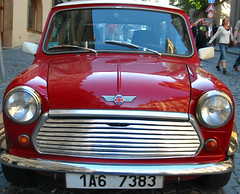
About three years ago, 15 August to be exact, a guy by the name of Wade Haines left the Moosehead Brewery in New Brunswick, Canada with a tractor-trailer loaded with 54,000 cans of beer bound towards Toronto. Neither Haines nor the beer arrived. What exactly happened has never been fully explained. The truck was found two days later in New Brunswick, but the beer was gone, as was the Haines. About a month later, the police would eventually track Haines down; he explained that since he thought he was going to be fired, and because he was frustrated with his girlfriend, he spontaneously decided to quit his job, and so he abandoned the truck in tact in a parking lot. The police didn’t believe him, and Haines was charged with the theft of $57,000 worth of beer. In the media, the police mocked Haines as being a “dumb criminal” because the stolen cans were ultimately destined for the Mexican market and were labeled in Spanish, which according to police, would make it impossible for anybody to fence the stolen booty.
Now, there is little question that Mr Haines is a tad on the stupid side. He has a criminal record for petty theft and even started referring to himself as the “beer bandit” while awaiting trail. The larger issue however is the stupidity of the police. Haines was clearly part of a larger conspiracy, but I wonder if the cops up there in Canada ever thought to ask Haines about it, or perhaps give him a little incentive to flip on his co-conspirators. Instead, in the end, Haines was prosecuted and sentenced to the max, about a year and a half in prison. Which brings us to the larger mystery, where’s the beer?
Nearly 8000 of the 54,000 cans were found soon after the theft, apparent victims of transit accidents. Presumably, the beer, which was packaged on pallets, was transferred from the tractor-trailer to numerous smaller trailers, trucks, and vans. But what about the remaining 46,000 cans? It’s been three years and the cops still have no idea what happened to those 46,000 cans of Moosehead beer.
So, who’s really the most stupid party here? The Canadian authorities assured the public that the beer could never be sold because of the conspicuous Spanish language labels. But if the beer could not be sold, where is it? Do they really want us to believe that somebody’s got 46,000 cans of beer (which has gone bad by now) buried in his back yard?
Of course, one can only speculate as to what happened to the beer. But the fact that this case is on the books as only partially solved doesn’t speak very well about the quality of police work involved, at least by those in charge of the case. And police assurances that the beer could never be sold in Canada due to the Spanish language labels or be smuggled into America because it lacks a proper manifest is both naïve and comical.
Then there is the matter the victim of this crime, Moosehead, which actually profited from it. One can assume that the cargo was insured, but more importantly, the great Canadian beer theft was reported on internationally and gave Moosehead countless thousands of dollars worth of free advertising. Moosehead even incorporated it in their own advertising, and today, three years later, has a page on their website dedicated to the theft.





